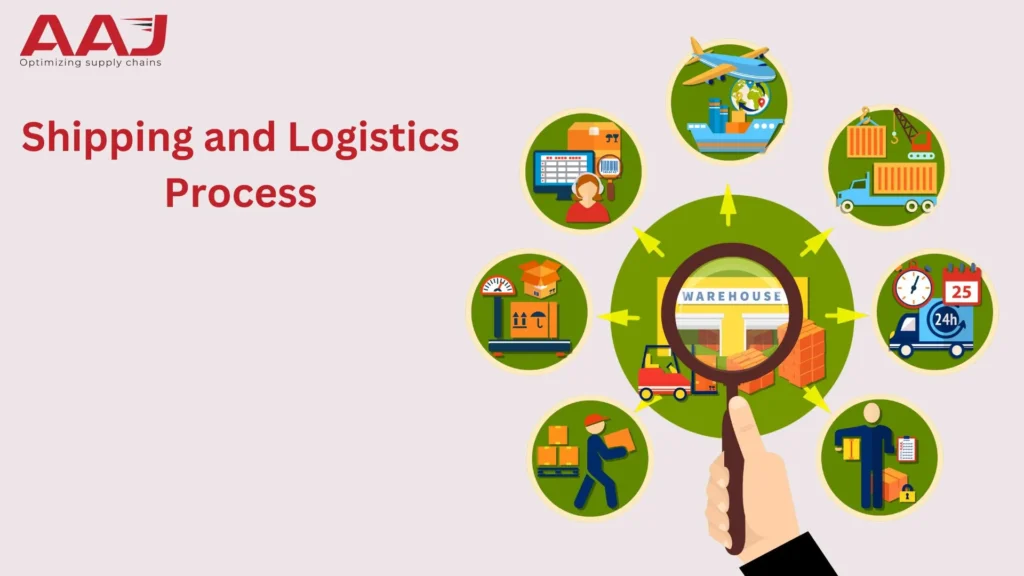Achieving remarkable business growth requires a different approach. While some prioritize closing sales deals, others highlight the importance of lead generation through marketing efforts. It is obvious that providing outstanding customer service cultivates enduring loyalty. However, a crucial yet sometimes overlooked factor is efficient shipping logistics. Improving its simplicity will hasten the expansion of your business.
Delivering products promptly and undamaged is paramount for businesses shipping goods. The current climate of unstable markets, intricate supply chains, and fierce rivalry makes this situation more challenging. Therefore, it’s crucial to investigate enhancing shipping operations through optimal logistics technology and strategies.
What is Shipping and Logistics?
Shipping and logistics involve moving products from their starting point to the final customer. Shipping is the process of moving products through various forms of transportation according to their weight and destination. It requires cooperation between several parties to enable smooth transit from origin to delivery.
Logistics, however, incorporates strategic planning that integrates all service providers involved in the process efficiently. Its objective is accurate and timely delivery of orders. Logistics companies in India manage the planning of products, procurement, storage, and transportation of commodities to their intended location. The supply chain, first-mile delivery, drayage, and shipments to final customers are essential phases in the shipping and logistics life cycle.
Types of Shipping Logistics Services:
Freight Forwarding:
Moving items cross-country or globally often requires expert assistance. For businesses, freight forwarders manage shipping procedures, facilitating efficient product transportation. They plan transportation, handle paperwork, and handle customs clearance. Air freight, ocean freight, or ground freight are the primary modes of freight forwarding.
- Air Freight: Provides rapid delivery timeframes, though it remains the most expensive shipping choice. Air transport delivers goods to destinations fast, especially for urgent shipments. Companies on a tight budget that want less speed could choose more affordable options like haulage or ocean ships.
- Ocean Freight: Although slower than air freight, ocean freight offers a more budget-friendly solution. This option is a cost-effective solution for people on a restricted budget and is ideal for shipments that are not time-sensitive. Keep in mind that it may take several weeks or months for your goods to reach their final destination.
- Road Freight: Road transport moves goods efficiently. Companies combine it with air and sea freight to get products from ports to destinations. They use road freight for the final destination of shipments.
Warehousing and Distribution:
Warehousing and distribution services encompass the storage, handling, supervision of inventory, and distribution of goods. They can run their facilities or hire third-party logistics providers (3PLs). These services aid in the optimization of stock levels. They ensure orders shipping logistics promptly. They also provide flexibility for seasonal demand changes.
Supply Chain Management:
Supply chain management is the overall process of planning, controlling, and overseeing the flow of goods and services. Coordinating supplier, manufacturer, distributor, and customer operations is part of it. This process streamlines operations to ensure products are delivered on time. It requires collaboration with reverse logistics providers and detailed scheduling to satisfy customers.
Custom Brokerage:
Customs brokers assist exporters and importers in navigating the laws governing customs. Their primary responsibility is ensuring that all regulations are followed while moving products across borders. They take care of paperwork and clearance processes, which helps the flow of goods.
Last-mile Delivery:
Last-mile delivery is the last stage of the ecommerce fulfillment supply chain that physically links brands with consumers by delivering their purchases. Package lockers, customers’ homes, or places of business receive goods that are brought from a warehouse or distribution center.
Key Processes in Shipping & Logistics

Order Fulfillment:
Running a business requires order fulfillment, which entails various steps to ensure that customers get their online orders effectively. Multiple tasks need to be carried out to accept, process, and deliver the order promptly. Order processing, information verification, product selection from inventory, safe packing, and delivery planning are all included in these duties.
Transportation and Routing:
One of the most important processes is the transportation of products. The routes used to move things affect how well the process works. It also affects how much the process costs. Choosing the right routes is critical. Logistics services experts must pick routes carefully. They need to look at the total distance the goods will travel. They also need to look at the transportation type and quality of roads and infrastructure. Considering these factors, professionals can determine the most efficient manner to carry items. They provide cost-efficient and timely door to door delivery services for products.
Inventory Management:
Proper inventory tracking is crucial. It involves carefully balancing supply and demand. Sufficient inventory management is necessary to accommodate changing consumer demands. This strategy avoids shortages while minimizing storage expenses. Sufficient inventory should not tie up too much cash, but it should still be sufficient to fulfill orders promptly.
Packaging and Labeling:
Moving products safely is crucial, and packaging plays a vital role. It facilitates handling, storing, and safeguarding goods while in transit. Following labeling rules is also important to meet global standards and laws, ensure product safety, and give customers needed information.
Documentation and Compliance:
Businesses depend heavily on having necessary documents and goods available. Having licenses, permits, documents, and other necessary papers can take a lot of effort and time. However, following laws and guidelines is essential for easy commodity movement across borders.
Importance of Shipping and Logistics in India
Effective shipping and logistics are very important for the growth of international trade and business. These procedures make it possible to move items quickly and easily over long distances, which is essential for global corporations. Companies provide cost-effective options to send goods to customers.
- Shipping and Logistics companies use advanced tech and software, which helps in effective inventory management. Orders are tracked, inventory is monitored, and delivery routes are optimized. The outcome is timely service at low prices.
- International trade is largely dependent on transportation and logistics. They encourage innovation, employment development, and economic expansion.
- Sustainable practices are promoted through efficient vehicles, optimized routes, and reducing empty trucks. As a result, the carbon impact is reduced for a greener future.
Benefits of Outsourcing Logistics Shipping Services:
Getting logistical support from outside providers has several upsides for organizations wanting smoother workflows and better productivity.
- Relationship Building: Outsourcing shipping logistics helps establish long-term partnerships with customers. Third-party logistics companies operate at a higher level than simple transportation brokers that only move freight.
- Expertise Access: Outside logistics providers bring extensive know-how, offering advanced personnel, procedures, and technologies. Using data insights, they may effectively manage obstacles, including carrier needs, shifts in the business, and variations in demand. Outsourcing shipping and logistic services helps determine the most efficient product route, providing expert help with evaluating options for the business. It can manage inventory and warehouse operations as required.
- Access to Technology: Outsourcing offers access to new technology, like the Internet of Things (IoT), which is now standard in supply chains. Outsourcing to a provider allows real-time inventory updates, benefiting agriculture, healthcare, retail, and future inventory strategies.
- Cost Reduction: Supply chain visibility improves cash flow by reducing inventories and reverse logistics expenses. Businesses can react faster to customer needs with a forward-deployed inventory model and agile courier network. Reverse logistics integration through outsourcing lowers transportation costs. Providers offer various services through a single contact point, eliminating the need to support multiple vendor accounts for warehouse services, fulfillment, and transportation.
- Scalability: Getting products delivered on time is a major goal. The shipping companies help goods reach their destinations fast. They have good supply chains to move things from one place to another place.
How to Choose the Right Shipping Logistics Company
Selecting the top logistics and shipping company is essential to improve supply chain operations. To help you make a decision, think about these important factors:
- Reputation: Evaluate the company’s reputation based on service quality and prompt deliveries. Look up reviews and ratings, and ask other customers who have used their services for their opinions.
- Logistics Capabilities: Review services provided, regions covered, and carrier availability. Discuss their transportation capacities, types of cargo accepted, and any potential dimensional limitations.
- Competitively-priced Shipping Packages: Looking for shipping logistics services necessitates looking at more than just broad reach and high-quality options. Prior to signing a deal, it is essential to determine affordability and negotiate cost.
- Commitment and Support: Avoiding many departments and potential obstacles is necessary while handling the cargo process. The business ensures on-time delivery even in the case of delays by providing dedicated support and the most recent information on cargo status and delivery schedules. They should offer 24/7 online, email, and phone assistance.
- Fast Shipments: International shipping takes longer, but the company should minimize transportation time. Compare delivery schedules estimated by companies and their reliability. They must follow formalities and documentation for fast delivery.
- Insurance for Shipments: Many shipping and logistics companies don’t offer insurance. Insure valuable goods and perishables. Ask about insurance coverage and rates. Choose a company with comprehensive coverage at lower rates.
- Cargo Safety: Deliver cargo securely. Confirm safety measures, packing, shipment methods, and warehouse facilities with the shipping company. Examine reviews to get knowledge.
- Consistency & Experience: Consistent performance requires a dedicated shipping company with defined processes. Experience helps rule out errors. A newbie may introduce risky methods.
- Service Quality: Look for quality in a logistics provider. Cheap services may compromise quality and harm your reputation. Verify service quality and cash on delivery services before choosing one.
- Global Reach: A shipping and logistics company with a worldwide reach can handle shipments without limitations. They need enough carriers to meet your requirements and serve your needs.
Conclusion
International trade depends on efficient shipping and logistics services. These services move goods across borders, making customers happy. In today’s connected world, understanding shipping logistics is key to business success. By working with skilled logistics providers, businesses may improve operations, seize global opportunities, and manage supply chains more skillfully. Working closely with reliable shipping partners is crucial for lasting success in worldwide trade.



